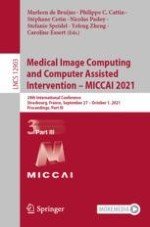2021 | OriginalPaper | Buchkapitel
Personalized Retrogress-Resilient Framework for Real-World Medical Federated Learning
verfasst von : Zhen Chen, Meilu Zhu, Chen Yang, Yixuan Yuan
Erschienen in: Medical Image Computing and Computer Assisted Intervention – MICCAI 2021
Aktivieren Sie unsere intelligente Suche, um passende Fachinhalte oder Patente zu finden.
Wählen Sie Textabschnitte aus um mit Künstlicher Intelligenz passenden Patente zu finden. powered by
Markieren Sie Textabschnitte, um KI-gestützt weitere passende Inhalte zu finden. powered by
